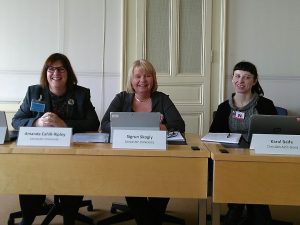NEW!
Dr Amanda Cahill-Ripley and Karol Balfe brief the UN Committee on Economic, Social and Cultural Rights

On 26th March 2018 Dr Amanda Cahill-Ripley and Karol Balfe briefed the UN Committee on Economic, Social and Cultural Rights on The International Covenant on Economic, Social and Cultural Rights and Sustaining Peace at their 63rd session in Geneva.
Dr Amanda Cahill-Ripley, (Academic Lead, Lancaster University) and Karol Balfe, (Head of Tackling Violence and Building Peace, Christian Aid Ireland), presented the project’s research to the principle international human rights treaty body concerned with protecting and promoting economic, social and cultural rights at the United Nations. The briefing was hosted by the UN CESCR Secretariat and Freidrich Ebert Stiftung (project partners) and aimed to highlight how economic, social and cultural rights can contribute to sustaining peace, which includes conflict prevention, peace-making, transitional justice and post-conflict peacebuilding. It also provided the Committee with some country examples based on Christian Aid Ireland local partner’s experiences in the field of how attention to economic, social and cultural rights in conflict affected settings is necessary and how the Committee could address such issues within their engagement with State Parties to the Covenant.
The briefing was very well attended by both Committee members and invited NGOs such as the Quaker UN Office (project partners); the Global Initiative for Economic, Social and Cultural Rights, and the Women’s International League for Peace and Freedom, as well as the Office of the High Commissioner for Human Rights Economic, Social and Cultural Rights Team.
The briefing also marked the official launch of the project’s new report based upon groundbreaking research entitled, ‘Economic, Social and Cultural Rights and Sustaining Peace: An Introduction’ (see here). The main objective of the report is to enhance knowledge and develop understanding of how economic, social, and cultural rights can contribute to a sustaining peace approach to peacebuilding. It also makes concrete recommendations to States and other stakeholders, such as human rights and peacebuilding bodies, as well as NGOs and other civil society organisations, as to what they can do to highlight the nexus between economic, social, and cultural rights and sustaining peace, and how to incorporate such rights into their peacebuilding actions. With this objective in mind, the report provides an overview of the topic and offers analysis of the benefits and challenges to better understand how addressing economic, social and cultural rights can contribute to all peacebuilding processes – from conflict prevention to post-conflict peacebuilding.